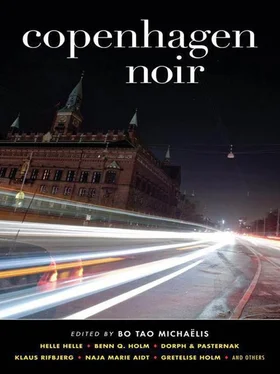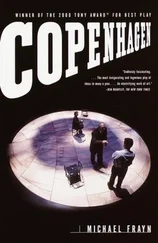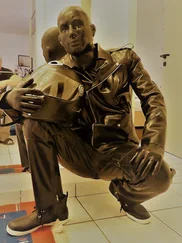For a long time, Europe has begun for most Norwegians in Copenhagen, and Central Station is the gateway to the rest of the continent. There you can buy an aquavit in the cafe at eight in the morning, even on Sunday, and you realize at once that you have arrived in another world.
Norway’s capital was located in Denmark for four hundred years. The despotic Danish sovereigns ruled from Copenhagen with an iron hand. At the beginning of the 1700s, a young man traveled from Norway to Denmark and became the first modern Nordic writer: Ludvig Holberg. Danes claim him for their own, Norway says he is Norwegian, but we in Bergen don’t take the debate all that seriously. We know exactly where he came from. The Danish encyclopedias also put it quite correctly: Danish writer, born in Bergen.
I had followed in Holberg’s footsteps many times myself, not in the pursuit of happiness, but usually to search for some young person who had run away from home. Copenhagen was also the most natural place for those on the run to hide out. It wasn’t so difficult to get there, but still you felt you were far away from home.
After the regular ferry route between Oslo and Copenhagen had developed into a floating orgy of alcohol and the night train from Oslo had been discontinued, most traveled by air to Kastrup, Copenhagen’s airport. Generally I had taken the train. Now the only train ride was the one from the airport, but Central Station was still the customary place to get off. You took the escalator up from the platform to the main hall, where the big city’s noise and commotion hit you immediately. Arrivals and departures were announced over the speakers at regular intervals. Travelers of all nationalities and age groups passed by, some with backpacks, others with heavy suitcases that rolled on nifty little wheels, everyone on their way somewhere, even when waiting impatiently in groups. A railway station of this caliber is like a monument to the restlessness of the times, partings and farewells, greetings and embraces, teary smiles and sparkling laughter, noisy outbreaks of anger and murmured, intense confessions. All types of figures meet here, from the poorest beggar with outstretched hands to the richest businessman with the world’s fattest cigar clenched between his teeth like a lighthouse.
As for me, I didn’t stand out in any particular way. From the moment I walked into the hall, my gaze wandered from face to face, without much hope of finding the right one. After all, I hadn’t seen her for twenty-three years.
Heidi Davik was her name in 1985, and Heidi Davik was her name still. In the years between she had been married and divorced and changed her name back and forth. But both times it was her father who had given me the assignment.
The first thing he asked when he came to my office on that Thursday in November was if I remembered him. He was short, white-haired, and not too dissimilar from the candidate who had lost the American presidential election. But he was probably a few years younger, in his late sixties, I guessed. He was well-dressed, in a double-breasted suit.
“Faintly,” I answered.
“Thor Davik. You were in Copenhagen and found my daughter Heidi in the spring of 1985.” He opened the briefcase he’d brought with him and pulled out an old photo, yellowed and worn at the edges. “I gave you this shot back then.”
He handed me the photo, and I looked down and nodded. I recognized her. Back then she had been a sweet little girl, sixteen, with long, dark hair, a self-conscious gaze, and a nice smile. I had found her in Christiania, the free state, where she was living in the back room of what resembled a ceramics workshop, with a Dane two years older than her who had even longer hair and a short, scruffy beard, reddish-blond. There had been wailing and gnashing of teeth when I convinced her to accompany me back to Bergen, but it didn’t come to blows when she had to part with her soulmate. He looked rather miserable when I escorted Heidi out to Pusher Street and through the gateway of what had once been an abandoned military area, but which was still Scandinavia’s most popular hippie colony, though it had aged somewhat, just like the hippies.
“She doesn’t look like this now, I assume?”
“No, I just wanted to… Here!” He handed me a much more recent photo of an adult Heidi. I recognized her look and smile, but her hair was cut very short and bleached in blond streaks.
“So what’s the story?”
He gave me the short version. After returning home from Copenhagen, things had gone well for her. She studied to be a physical therapist, got a full-time job, married a colleague, and after seven years of marriage without children, she got a divorce. “Her name was Lorentzen when she was married, but she took her maiden name back after the divorce.”
“And what brings you here today?”
His gaze wavered. “It sounds almost like a bad remake of some film, but… she’s back in Copenhagen. She’s been there for fourteen days, and she doesn’t answer her phone. We don’t know where she’s staying, either. I… her mother is very worried.”
“But she’s an adult now.” I made a quick calculation. “Close to forty, if I’m not mistaken.”
“So what?” He seemed aggravated. “Your children are your children, all their lives.”
“And you won’t go down and try to find her yourself?”
“No. It’s impossible. She blames us for everything that’s gone wrong.”
“Everything that’s gone wrong? You’ve just described a more or less normal life.”
“Yes, well, except that we forced her to come home back then. She has never been able to forgive us for that.”
“The young man she was staying with down there… did she ever hear from him again?”
He scrunched his lips together. “We don’t know. But… we found this, among her papers, after she moved back in with us following her divorce. A small apartment in the basement. We can come and go…”
I realized he was trying to make excuses as best he could, and I held out my hand. He gave me a tourist postcard, conventional, with a photo of Tivoli on the front. I turned it over. There wasn’t much written: I’ll meet you here, as planned. If problems, call this number. Your Christian . Below it he had written a telephone number that began with 45, the country code for Denmark.
I looked at the more recent photo again. “Christian-and a phone number. Have you tried calling him?”
“Yes, but he said I must have the wrong number.”
“I see.”
“And we don’t have the strength for it. I want you to go to Copenhagen and see this man, Veum. We want to know what has happened to our daughter. Why she doesn’t answer us…”
I took the job, got on the Internet, and reserved a plane ticket for the next day. Meanwhile, I searched for the name and number and found what I was after: Christian Mogensen, with an address on Wesselsgade, which according to my well-worn map of Copenhagen lay right next to Sortedams Sø, one of the city’s lakes.
I thought about calling him before I left Bergen but decided that it would probably be more effective to wait until I was a short taxi ride from where he lived.
It worked. The man who answered the phone sounded flustered when I introduced myself as a private investigator from Bergen, but he admitted that he was indeed Christian Mogensen and that he had sent a card to an old girlfriend in Bergen. I said that if he didn’t provide information that would lead me to Heidi Davik, I would be at his door like some crazy Viking faster than he could say “three mackerels.”
He hesitated a few seconds, but when I added “or like a bulldog gone berserk,” he gave me an address on Lille Istedgade and said that’s where I would find her, if she was at home.
Читать дальше












